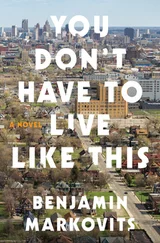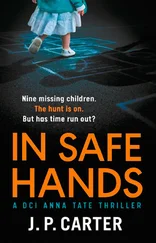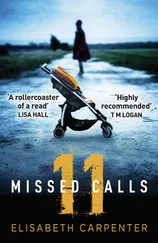I thought of sending him something explicit. Something I’d like to do with him. But in all honesty all I really wanted to do was stay here in bed until everything changed around me. Besides which, it was a challenge for me to compose erotic messages. I always got lost in the parts of speech: if I wanted something involving one particular part of his body, I had trouble not using the preposition “with,” telling him to do something “with” it, or else I would be telling him to “put” it someplace. Both structures made the part eerily passive, something he could pick up and set down and use or not use, like a hammer or a telephone. The same thing happened when he talked about things he would do to a particular part of my body: the body that emerged from his description seemed to have only three or four parts, linked hazily by what I would assume was more body. Talking about my body in any way took me apart. Afterward I would lie still and try to put myself back together, naming the parts one by one silently, in order, beginning with the small bones of the foot.
Then there was describing the deixis of the thing through prepositions and directionality: inside me was in, up, deep, down, farther, through — contradicting directions that didn’t seem to add up to one whole person operating in space, much less two. I always had to think about the planar orientation of my body — was I vertical or horizontal? “Put it all the way across.”
In watching porn and listening carefully to what the people on-screen were saying as they did the things they were doing, I had come to understand that the only stable point of orientation was the stomach. Even though they never mentioned it explicitly in their porn talk, all the ins and ups and downs and deeps seemed to indicate a line cutting through the vagina, through the uterus, and right into the center of the body, which also happened to be the center of digestion. This center seemed to be where everyone wanted things to go, deeper and deeper to the innermost point, where they could finally rest.
I rolled over in bed and sent C a text message: I’m starving!
Then I rolled onto my back and stared up at the ceiling. I had at least one eye, pointing straight upward. From this perspective it was easy to pretend that all things were in a state of perfect stillness. If something in the world had moved or acted, then its action would have affected something else, which in turn would be compelled to react. Its reaction, an action upon things other than itself, would cause other reactions that would change the states of other things, a domino effect that would eventually topple something in my visual field, which consisted solely of ceiling. As the ceiling remained the same, so must everything else. That, or the ceiling was shifting but my eyes were not, would never be, sharp enough to perceive it.
I got C’s reply after a few minutes. Eat something from the kitchen, it read.
B would be out in the kitchen or just near it, maybe watching for me, maybe waiting to make me do something. I didn’t know how to tell C that I was afraid to leave this room and step out into the other parts of the house. I didn’t know how to say I was afraid of diluting myself if I encountered B in this fuzzy state, where she resembled me more than I did myself. A woman’s body never really belongs to herself. As an infant, my body was my mother’s, a detachable extension of her own, a digestive passage clamped and unclamped from her body. My parents would watch over it, watch over what went in and out of it, and as I grew up I would be expected to carry on their watching by myself. Then there was sex, and a succession of years in which I trawled my body along behind me like a drift net, hoping that I wouldn’t catch anything in it by accident, like a baby or a disease. I had kept myself free of these things only through clumsy accident and luck. At rare and specific moments when my body was truly my own, I never knew what to do with it.
I picked at a patch of loose skin on my foot, a whitish patch lifting up from the substrate. It must have loosened while I was walking. Tugging on it, I felt the skin pull on my foot, but nothing from the patch itself. It was already leaving me. If I could look into my insides and poke at them, see them day after day, have control over their color and texture, maybe then I’d feel close to the pounds and pounds of matter that lived within me, in my blind spot. Until then, the outer layer would be the innermost part of me, the thing that would evacuate me if stolen, the absolute core.
HOURS LATER, MY PHONE BUZZED.It was C. His message read: Did you eat something yet?
The eggy white of the ceiling was growing grayer all the time. Its nullness was more difficult to see, though there was as much of it. Ted Hartwell, Matt Skofield, Dennis Galp. Had they felt like this before they felt like disappearing; had they stared at their walls for hours, hoping for something to change? A span in my stomach registered discomfort: it ached first like an absence, next like a stone. It read as a trembling, a shiver without the cold, and then as a solid, a sluggish setting of the soft squish in my middle. It was hunger, I thought. It changed in quality as it changed in quantity: it seemed hunger was a tiered thing, a mountain rising to a peak, and each new altitude would be different from the last. Even though a portion of myself was interested in this, interested in climbing to the top of this hunger and discovering what it felt like at its end, it was a normal human life that I was living, and that meant continuing to eat, eating with no end in sight. I got up to go quickly to the kitchen and grab something whole and bring it back to my room to eat it there, alone. If I moved quickly and quietly, B might miss me entirely.
In the kitchen I grabbed an orange and a piece of string cheese and two energy bars specially formulated for women to eat; they were full of folic acid and had a round, feminine shape. Then I heard a noise from behind me. It was a small urgency, like the sputter of a motor the size of someone’s pocket, but it was so close. I expected to see B standing there with something aimed at my head, an electric toothbrush, maybe, or a drill. But there was nobody behind me and nothing really except a window with the curtain still hanging before it, and from the curtain the sound of that little motor going and going and stopping and then going and going. I walked toward it, still thinking of that blank space behind the back of my head that I couldn’t see or protect. When I moved the curtain, there was a pause. And then a dragonfly, beating itself against the screen over and over, whirring like a thing made of feathery gears. Musical sounds came from the surface as it struck the screen, buzzing and chiming, close enough to my face that I could see the smooth panels of its body.
The dragonflies I knew lived only for a few weeks out of the summer and were lazy, hanging still in the air four or five feet above anybody’s head before gliding to the next stopping point. This one was desperate, and though it looked sturdy, something so small and living couldn’t be designed to outlast that sort of wear, repetitive and dumb. I put my finger on the screen where it seemed to be aiming and the sounds paused. I heard the breeze rush around in the quiet. Then the small crashes began again, a few inches below my fingertip. It was easier to watch insects trapped indoors, on their way to a frantic death, than it was to watch this one killing itself to get in. There was nothing for it in here. In here it would die. As soon as it was inside, it would understand it had to get out.
Feet shuffled across the kitchen tile. I turned around and it was B standing there with a cup in her hand, the prettiest one we had, made of thick blue glass. Her face was stark without makeup on, full of peaks and valleys. Her eyes had a hungry look.
Читать дальше




![Ally Carter - [Gallagher Girls 01] I'd Tell You I Love You But Then I'd Have to Kill You](/books/262179/ally-carter-gallagher-girls-01-i-d-tell-you-i-lo-thumb.webp)







